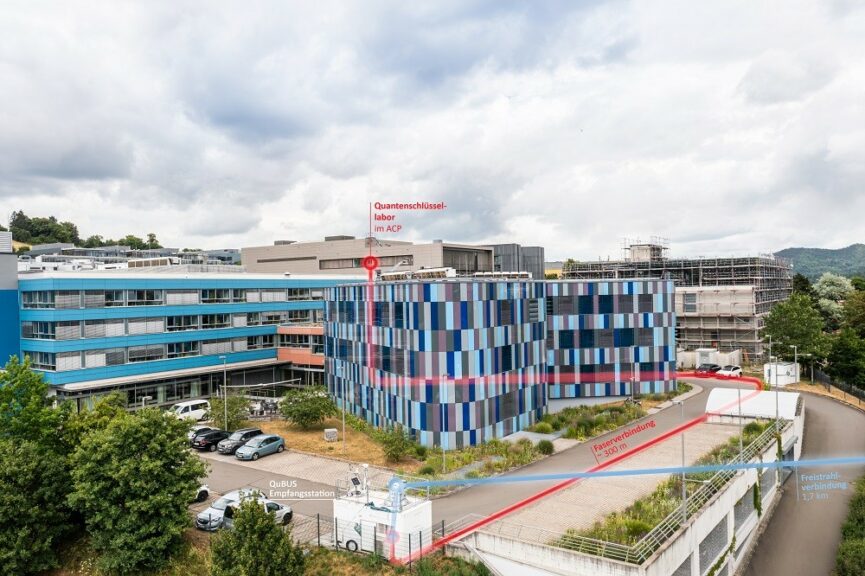The communication of the future is to become more secure with the help of light particles. This is the goal of the QuNET initiative by the BMBF.
Researchers from Jena, Berlin, Erlangen-Nuremberg and Wessling have successfully distributed quantum keys between two points using a combination of free-space and fiber links under everyday conditions. On a heterogeneous test bed in Jena, they achieved key rates in the kilobit range per second in daylight. The experiment was implemented as part of the QuNET initiative, a pilot project funded by the German Federal Ministry of Education and Research (BMBF) to develop highly secure communication systems based on quantum technologies.
The communication of the future is to become more secure with the help of light particles. This is the goal of the QuNET initiative by the BMBF. The initiative’s partners – the Max Planck Institute for the Physics of Light, Friedrich Alexander University Erlangen-Nuremberg, the DLR Institute of Communications and Navigation, and the two Fraunhofer Institutes for Applied Optics and Precision Engineering IOF and the Heinrich Hertz Institute HHI – have now taken an important step toward quantum-safe networks: With a key experiment, they have shown how multiple quantum-secured point-to-point links can be realized and combined for future scalable quantum-safe networks. They not only combined transmissions of quantum keys via free-space and fiber links, but also achieved transmission rates in the kilobit range per second in daylight.
Read more
Further information

The communication of the future is to become more secure with the help of light particles. This is the goal of the QuNET initiative by the BMBF.
Researchers from Jena, Berlin, Erlangen-Nuremberg and Wessling have successfully distributed quantum keys between two points using a combination of free-space and fiber links under everyday conditions. On a heterogeneous test bed in Jena, they achieved key rates in the kilobit range per second in daylight. The experiment was implemented as part of the QuNET initiative, a pilot project funded by the German Federal Ministry of Education and Research (BMBF) to develop highly secure communication systems based on quantum technologies.
The communication of the future is to become more secure with the help of light particles. This is the goal of the QuNET initiative by the BMBF. The initiative’s partners – the Max Planck Institute for the Physics of Light, Friedrich Alexander University Erlangen-Nuremberg, the DLR Institute of Communications and Navigation, and the two Fraunhofer Institutes for Applied Optics and Precision Engineering IOF and the Heinrich Hertz Institute HHI – have now taken an important step toward quantum-safe networks: With a key experiment, they have shown how multiple quantum-secured point-to-point links can be realized and combined for future scalable quantum-safe networks. They not only combined transmissions of quantum keys via free-space and fiber links, but also achieved transmission rates in the kilobit range per second in daylight.
Read moreFurther information